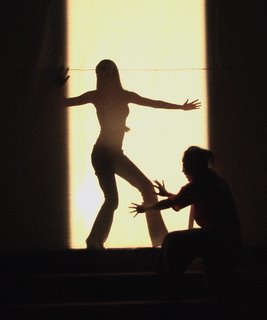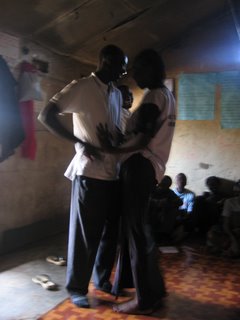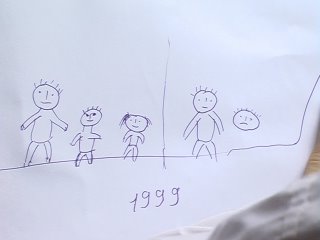Theatre as a process..
Most people when they hear the word "Theatre" immediately imagine of a stage, a performance, and audience. It's more so when I introduce myself as a "Theatre for Development" practitioner.. Especially for Vietnamese, since "sân khấu" (stage) is the term, I have had a hard time trying to explain that I am not a producer, not a director, not an actress.., not a stage manager..

At first I tried explaining the work I do as "using creative activities for people to explore and gaining insight about themselves..".., but in Vietnamese that sounded too vague and mystical. So I made it simpler by telling "imagine small children going to nursing school, how do they grow? By singing song, drawing, playing games.. right? My role is like a teacher..".

Now, at first that explanation seemed alright, but how many times have my lecturers told us "we are not teachers, we are FACILITATORS".. This "F" word is a term brought to Vietnam through NGO workers and their associates, and to most Vietnamese people, the translated version of it is either "Master of Ceremony" (MC).. or "The one who executes" (người điều hành) or 'the one who guides" (người dẫn trình).. and I am not satisfy with the terms, either because it doesn't say accurately enough, or because it is too hard to visualise and understand.

Vietnamese knows of Physical therapy and Psycho therapy.., so I tried my luck with the term drama therapy (which doesn't exit in Vietnam) "trị liệu tâm lý dùng phương pháp nghệ thuật"... But hang on, theatre for development is not drama therapy, even though it does provides certain therapic effect, but it is definitely not drama therapy... I had a degree in Psychology.. but I wouldn't take risk calling myself a therapist, be it dramatically or anythingally.

"Theatre-based techniques are useful to any development initiative which aims to build upon the intellectual emotional and creative resources of each participant...draws on the specificallly human capacity to create and to invent new ways of life and can therefore facilitate a process whereby people not only adapt their environment, but also transform it with their own creative initiatives" (Julie McCarthy, enacting participatory development)


Imagine you are discussing stuff with your friends, sometime we don't even know where the discussion will lead us to, but often in such situation our minds are provoked, questions, and tested.. We might not find a beautiful solid answer by end of the discussion, but the PROCESS of it might have helped us realising or questioning about other things. Same thing with "theatre for development", it is not what the outcome look like, (I often say the "performance" is just an "excuse"), but participants' experience while working towards that "excuse" is the main thing that we care about. Yahh.., something like that!
All photos on this page were shot during my work with different participants.

At first I tried explaining the work I do as "using creative activities for people to explore and gaining insight about themselves..".., but in Vietnamese that sounded too vague and mystical. So I made it simpler by telling "imagine small children going to nursing school, how do they grow? By singing song, drawing, playing games.. right? My role is like a teacher..".

Now, at first that explanation seemed alright, but how many times have my lecturers told us "we are not teachers, we are FACILITATORS".. This "F" word is a term brought to Vietnam through NGO workers and their associates, and to most Vietnamese people, the translated version of it is either "Master of Ceremony" (MC).. or "The one who executes" (người điều hành) or 'the one who guides" (người dẫn trình).. and I am not satisfy with the terms, either because it doesn't say accurately enough, or because it is too hard to visualise and understand.

Vietnamese knows of Physical therapy and Psycho therapy.., so I tried my luck with the term drama therapy (which doesn't exit in Vietnam) "trị liệu tâm lý dùng phương pháp nghệ thuật"... But hang on, theatre for development is not drama therapy, even though it does provides certain therapic effect, but it is definitely not drama therapy... I had a degree in Psychology.. but I wouldn't take risk calling myself a therapist, be it dramatically or anythingally.

"Theatre-based techniques are useful to any development initiative which aims to build upon the intellectual emotional and creative resources of each participant...draws on the specificallly human capacity to create and to invent new ways of life and can therefore facilitate a process whereby people not only adapt their environment, but also transform it with their own creative initiatives" (Julie McCarthy, enacting participatory development)


Imagine you are discussing stuff with your friends, sometime we don't even know where the discussion will lead us to, but often in such situation our minds are provoked, questions, and tested.. We might not find a beautiful solid answer by end of the discussion, but the PROCESS of it might have helped us realising or questioning about other things. Same thing with "theatre for development", it is not what the outcome look like, (I often say the "performance" is just an "excuse"), but participants' experience while working towards that "excuse" is the main thing that we care about. Yahh.., something like that!
All photos on this page were shot during my work with different participants.